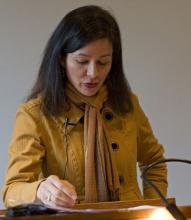What Is It
Sometimes people who seem to be your epistemic peers – that is, people as experienced, as well trained, as thoughtful, and as intelligent as you – disagree with you. Should this shake your confidence in your own beliefs? When, how much, and under what conditions? Ken and John search for common ground with Jennifer Lackey from Northwestern University, author of Learning From Words: Testimony as a Source of Knowledge.
Listening Notes
It seems like two reasonable, intelligent people who have access to the same evidence should come to the same conclusion. So why is it that this is so often not the case, and that people are often confident in entirely opposite conclusions? John and Ken start off the show by honing in on what they aren’t going to discuss. John and Ken have opposite opinions on the taste of lima beans, for example, but this doesn’t constitute a real disagreement because there is no incompatibility between one person liking lima beans and another person despising them. Rather, disagreement of the relevant kind concerns factual matters. John wonders if there isn’t some inevitable amount of arrogance in belief formation; he has no choice but to develop beliefs based on his own evidence and his own reasoning after all. Ken says that others’ beliefs, and the fact that there is disagreement in the first place, should give you further evidence about the question at hand.
Ken and John invite Jennifer Lackey, Professor of Philosophy at Northwestern University, to the conversation. Jennifer starts by saying that people are inherently fallible at tracking truth, so disagreement is useful because it encourages individuals to re-examine and re-inform their beliefs. Next, Ken asks what should be done in cases of disagreement, and Jennifer responds by remarking that it’s dependent on the specific case.
The conversation moves towards a discussion about who can be said to be an “epistemic peer,” someone who is similar in reasoning ability and access to evidence to another. One of the criteria for considering someone as such, Jennifer claims, is a motivation to discover the truth. However, a phone caller points out that even if someone is not your epistemic peer, you may still be unable to dismiss their belief if its result affects you. Ken wonders if there may be a dark side to the idea of assigning epistemic peers. Can’t you simply insulate your beliefs by ruling out others as epistemic peers? Jennifer agrees; a religious person, for example, may not view a non-religious person as being privy to the same evidence, and therefore not qualified for consideration as an epistemic peer.
In the latter portion of the show, the focus shifts to political and religious disagreements. Jennifer also teases apart the difference between a practical belief and a epistemically rational one. She concludes by saying that by using disagreement as an opportunity to reconsider and adjust accordingly, we can avoid being both spineless and dogmatic in our beliefs.
- Roving Philosophical Reporter (Seek to 5:44): Listeners are offered a glimpse into the lives of Joe and Carol McLaughlin, a married couple from San Francisco with fundamentally different political beliefs. They describe the strategies they employ to deal peacefully with their differences.
- 60-Second Philosopher (Seek to 48:41): Ian Shoales shares with listeners his personal opinions on a range of topics, from zombie movies to Vietnam, and the disagreements with others that these have sparked. He concludes by scorning the idea of “agreeing to disagree” as nothing more than a passive-aggressive form of simple disagreement.



